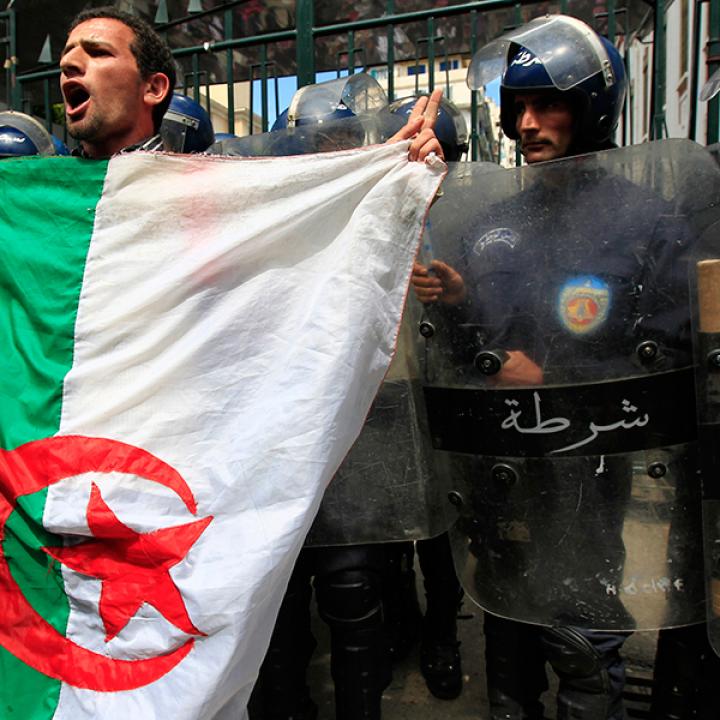

As Algiers braces for wider protests, Washington should coordinate with Arab and European allies to signal the government that it risks losing control unless it changes course.
Three weeks into a protest movement that broke out on February 22, the capital of Africa’s largest country is expecting as many as 2 million people to take to the streets on March 8. Launched in opposition to an expected fifth term for eighty-two-year-old president Abdelaziz Bouteflika, Algeria’s demonstrations have remained mostly peaceful thus far, but the possibility of violent clashes with state security forces will increase as the number of protestors swells. The coming days could determine whether one of the few countries to avoid the tumult of the Arab Spring embarks on a path toward reform or descends into chaos.
WHY ARE THEY PROTESTING?
Algeria is no stranger to demonstrations—in recent years, the country has seen thousands of small-scale protests over local issues such as access to housing and jobs. Yet the latest round represents the largest and most widespread since 2011, when a series of uprisings swept much of the Middle East. Algeria managed to avoid the worst of that strife, partly because memories of its decade-long civil war in the 1990s seemed to dissuade broader mobilization, and also because the government quickly dipped into its coffers to expand social welfare benefits. Neither deterrent appears to be operating today, however.
The proximate cause of the current protests was the perception that Bouteflika would run for a fifth five-year term in the April 18 presidential election, despite remaining largely out of public view since suffering a stroke in 2013. The formal announcement of his candidacy came on March 3—a week after he reportedly flew to Geneva for medical treatment, and two days after an estimated 800,000 protestors filed into the streets of Algiers to demand that he not run.
The deeper causes of the unrest lie in a sclerotic political system and a deteriorating economy. Since gaining independence from France in 1962, Algeria has been governed by an opaque alliance of military leaders, intelligence officials, business elites, and politicians collectively known as Le Pouvoir (The Powers That Be). For decades, much of this faction’s legitimacy stemmed from the fact that many of its members participated in the struggle for independence. Bouteflika, who assumed power in 1999, is among the last remaining elites of that generation and is widely credited with helping the country attain a measure of stability following a civil war that claimed an estimated 200,000 lives. Yet the decision to once again present his candidacy suggests that the elites presumably responsible for choosing his successor could not reach a consensus.
Moreover, references to the anti-colonial struggle and warnings of a return to the “black decade” of the 1990s carry little resonance for the 70 percent of Algeria’s 41 million residents who are under the age of thirty. Of more immediate concern to this generation is a youth unemployment rate of 25 percent and a steadily worsening economy that political elites have been unable or unwilling to improve. Algeria is heavily reliant on income from oil and gas sales, which constitute 95 percent of its export earnings and 60 percent of its budget revenues. The 2014 drop in global oil prices forced the state to dip into its foreign currency reserves, which have declined by nearly 50 percent since 2011. Meanwhile, restrictive business regulations severely limit foreign investment. Whoever holds power after the current electoral cycle will therefore face a dire economic situation in need of deep reform.
IMPLICATIONS FOR U.S. POLICY
Although Washington’s relationship with Algeria is not as robust as those it enjoys with neighboring Morocco and Tunisia, a serious bout of instability in the country would undermine American interests in the region. Algeria has emerged as a key counterterrorism partner in the campaign to degrade al-Qaeda-affiliated networks in the Sahel region to the south. For their part, European allies rely on Algeria to ensure a steady flow of hydrocarbons as their third-largest supplier of natural gas, and to reduce the flow of migrants from Africa. Algiers also recently joined multilateral talks aimed at resolving the decades-long conflict in Western Sahara.
Yet its response to the protests thus far has done little to reassure allies that these pillars of regional stability are safe. The government has replaced Bouteflika’s campaign manager and proposed that in the event he wins, he would serve only one year, and a national conference would be convened to prepare for a new election. These proposed concessions, coming so close to the current election, underscore the serious dysfunction of a government that had years to plan for an inevitable succession but clearly was not up to the task. Given today’s reports of widening protests, such offers are unlikely to calm the situation.
As such, Washington should prepare for the possibility of continued unrest, while quietly working with Arab and European allies in urging Algiers to craft a credible roadmap out of the impasse, one that adequately accounts for the protestors’ concerns. It should also consider broadening the channels of engagement to include discussions between U.S. Africa Command (AFRICOM) and Algerian army chief of staff Ahmed Gaid Salah, who has already pledged to maintain the country’s stability and security.
Sarah Feuer is a senior fellow at The Washington Institute.



